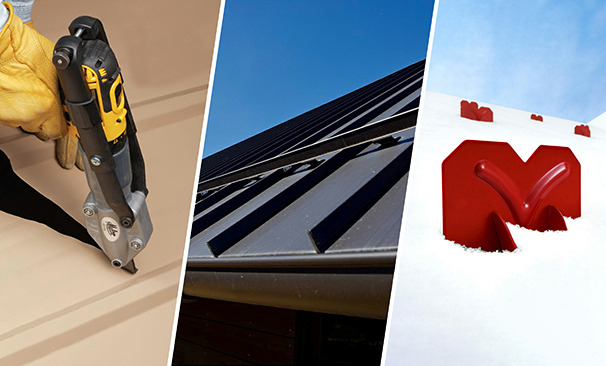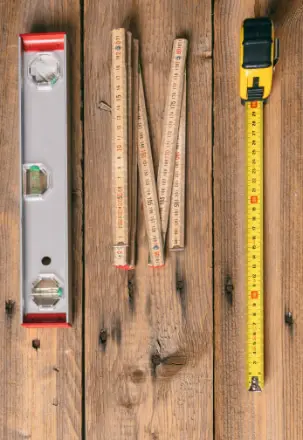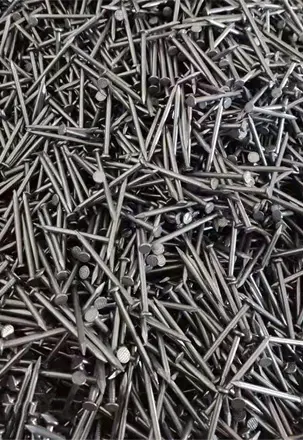When it comes to roofing installation, choosing the right type and size of roofing nails is just as important as selecting quality roofing materials. The size of the nail directly affects the roof’s durability, wind resistance, and waterproofing performance. Among the most commonly used options are 1/2-inch roofing nails and 1-inch roofing nails — but which one is the best choice for your project?
In this detailed guide, we’ll explore the differences, applications, pros, and cons of each nail size and help you make the right decision for your roofing needs.
Understanding Roofing Nails
Roofing nails are designed specifically to fasten roofing materials — such as asphalt shingles, felt, or metal sheets — to a wooden or steel substrate. Unlike common nails, roofing nails have a wide flat head and a short shank, allowing them to hold roofing materials securely without tearing or damaging them.
The most common materials for roofing nails include:
- Galvanized steel – corrosion-resistant and ideal for long-term outdoor exposure.
- Stainless steel – used in coastal areas for superior rust resistance.
- Copper – traditional and highly durable, but more expensive.
- Aluminum – lightweight but less strong than steel.
The length of roofing nails can range from 1/2 inch to 2 inches, depending on the roofing layer thickness, substrate, and type of roofing material used.
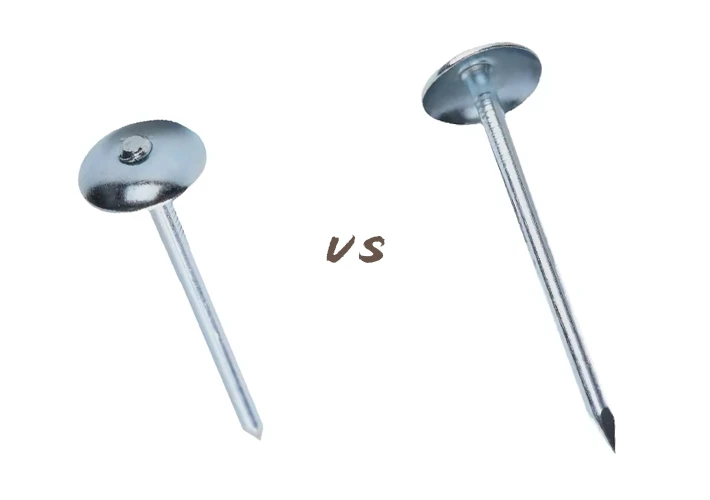
The Importance of Nail Length in Roofing
Nail length determines how deeply the nail penetrates both the roofing material and the roof deck beneath it. The general rule recommended by roofing experts is:
A roofing nail should penetrate the deck by at least 3/4 inch (19 mm).
This ensures strong mechanical anchoring and prevents nails from easily pulling out under wind load or thermal expansion.
That means the thicker the roofing material or underlayment, the longer the nail required. Using a nail that’s too short might lead to poor fastening, while a nail that’s too long can puncture deeper layers unnecessarily, causing leaks or insulation issues.
Overview of 1/2-Inch Roofing Nails
3.1 Basic Specifications
- Length: 1/2 inch (12.7 mm)
- Head diameter: 3/8 inch (9.5 mm)
- Common materials: Electro-galvanized or hot-dip galvanized steel
- Typical shank types: Smooth or ring shank
3.2 Applications
1/2-inch roofing nails are relatively short and are not recommended for thick roofing systems. They are typically used for:
- Fixing roof felt, underlayment, or insulation boards
- Attaching lightweight sheet materials like vapor barriers
- Temporary fixing before applying main roofing layers
3.3 Advantages
- Cost-effective: Less material used per nail
- Lightweight: Easy to handle during installation
- Reduces risk of deck damage: Ideal when you don’t want nails penetrating deep into the substrate
- Good for thin materials: Perfect for single-layer or underlayment applications
3.4 Disadvantages
- Limited holding strength: Not suitable for shingles or tiles
- Poor wind resistance: May loosen under high wind conditions
- Short penetration depth: Doesn’t meet the 3/4” penetration rule
- Not suitable for long-term roofing structures
Overview of 1-Inch Roofing Nails
4.1 Basic Specifications
- Length: 1 inch (25.4 mm)
- Head diameter: 3/8 inch (9.5 mm)
- Common materials: Hot-dip galvanized steel, stainless steel
- Shank types: Ring shank or spiral shank preferred for better grip
4.2 Applications
1-inch roofing nails are among the most commonly used sizes for residential and commercial roofing. They are suitable for:
- Asphalt shingles installation
- Composite or fiberglass roofing systems
- Metal roofing panels (thin sheet type)
- General repair and maintenance work
4.3 Advantages
- Excellent holding strength: Ensures shingles stay firmly attached
- Better wind uplift resistance: Meets roofing code requirements
- Deeper penetration: Secures through roofing layers and into decking
- Versatile use: Works with a variety of roofing materials
4.4 Disadvantages
- Slightly more expensive: Uses more metal material per piece
- Over-penetration risk: On very thin decks or lightweight materials
- Heavier weight: Slightly increases total roof fastener load
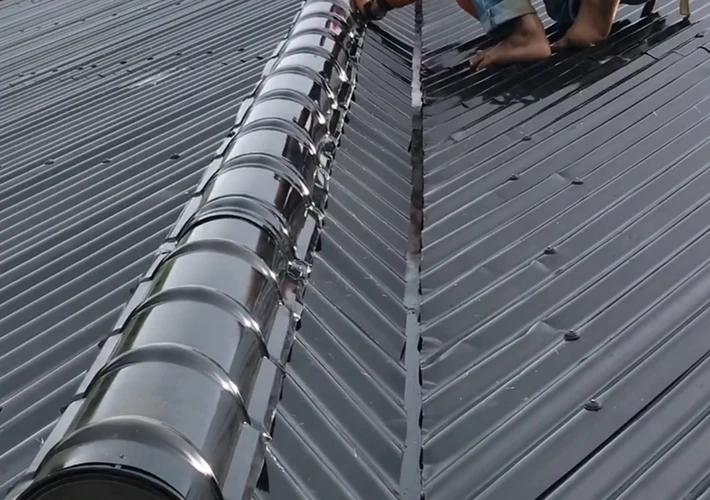
Direct Comparison: 1/2-Inch vs 1-Inch Roofing Nails
| Feature | 1/2-Inch Roofing Nails | 1-Inch Roofing Nails |
|---|---|---|
| Length | 12.7 mm | 25.4 mm |
| Penetration Depth | Shallow | Moderate to deep |
| Holding Strength | Low | Strong |
| Wind Resistance | Poor | Excellent |
| Suitable for | Felt, vapor barriers, underlayment | Shingles, tiles, metal sheets |
| Durability | Short-term | Long-term |
| Price | Cheaper | Slightly higher |
| Building Code Compliance | Not compliant for shingles | Meets most code requirements |
| Best for | Temporary use | Permanent roofing installations |
From this comparison, it’s clear that 1-inch roofing nails are more versatile, durable, and compliant with most roofing standards, making them the better choice for permanent installations.
Building Code and Industry Recommendations
According to the International Building Code (IBC) and the Asphalt Roofing Manufacturers Association (ARMA):
Roofing nails should penetrate at least 3/4 inch into the wood decking or completely through the deck sheathing if it’s thinner than 3/4 inch.
For most asphalt shingle roofing systems, 1-inch nails or 1 1/4-inch nails are required to meet this standard, depending on shingle thickness and the presence of underlayment.
Therefore, using 1/2-inch nails will not meet building code requirements for shingle roofs in most regions, especially in areas with high wind loads or heavy rainfall.
Material and Coating Options
Both 1/2-inch and 1-inch roofing nails can come with different coatings and finishes to enhance performance:
Galvanized Roofing Nails
- Most widely used
- Zinc coating prevents rust
- Suitable for asphalt, wood, and metal roofing
Stainless Steel Roofing Nails
- Ideal for coastal or humid environments
- Higher cost but long service life
Copper Roofing Nails
- Excellent for slate or copper roofing
- Provides a decorative finish
Aluminum Roofing Nails
- Lightweight and corrosion-resistant
- Not as strong as steel, suitable only for light materials
For outdoor durability, hot-dip galvanized nails are typically the most cost-effective and reliable choice.
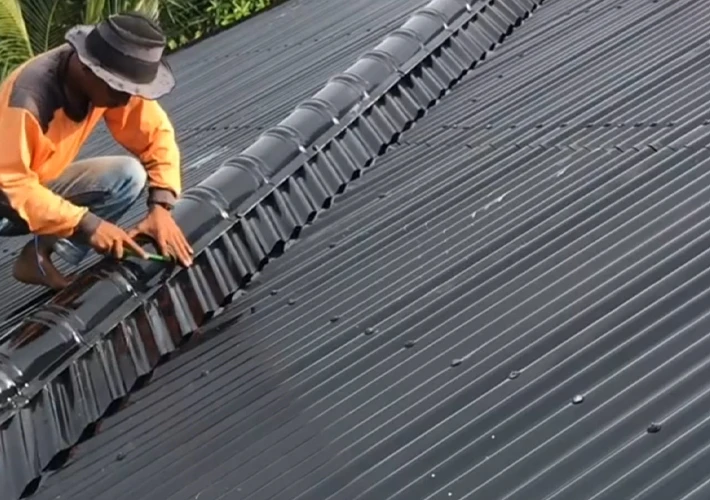
Choosing the Right Roofing Nail for Your Project
To determine which nail size to use, consider the following factors:
Roofing Material Type
- Asphalt shingles: Use 1-inch to 1 1/4-inch nails
- Roof felt or underlayment: Use 1/2-inch nails
- Metal roofing panels: Use 1-inch or longer nails
- Wood shakes or shingles: Use 1 1/2-inch nails
Roof Deck Thickness
Thicker decks require longer nails for proper penetration. For example:
- 1/2-inch plywood deck → 1-inch nail recommended
- 5/8-inch or thicker deck → 1 1/4-inch or 1 1/2-inch nails
Climate Conditions
In windy or storm-prone areas, choose longer nails with ring shanks for superior grip strength and uplift resistance.
Code Compliance
Always check local building codes, as some regions strictly specify minimum nail sizes and penetration depths.
Expert Tips for Roofing Nail Installation
Angle matters: Drive nails perpendicular to the roof surface.
Avoid overdriving: Overdriven nails can damage shingles and reduce holding power.
Use pneumatic nail guns with caution: Adjust air pressure to prevent over-penetration.
Choose the right shank type:
- Smooth shank → easy to drive, lower holding power.
- Ring shank → better grip, recommended for windy areas.
Inspect regularly: Replace rusted or loose nails promptly to maintain roof integrity.
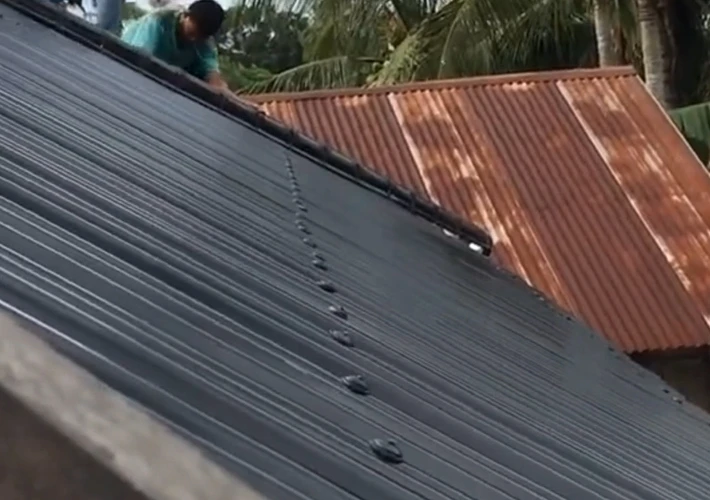
Conclusion: Which Should You Choose?
If you are working on temporary roofing layers, underlayment, or felt, 1/2-inch roofing nails are sufficient and cost-effective.
However, for permanent roofing installations such as asphalt shingles, composite roofing, or light metal panels, 1-inch roofing nails are the best choice. They provide:
- Stronger holding power
- Better wind resistance
- Full compliance with roofing codes
- Long-term durability
Final Recommendation:
Choose 1-inch galvanized or ring-shank roofing nails for most standard roofing projects.
They ensure secure fastening, extended lifespan, and peace of mind — no matter the weather conditions.


